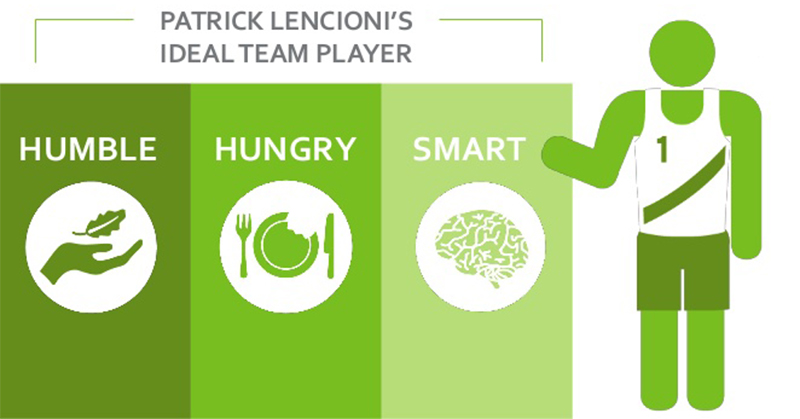

There is a baseline level of technical skills all people have to have depending on the job but those qualities need to be a higher priority and they need to be intentionally looked for and extracted during interviews in a very purposeful, strategic way. The way to find these kinds of people is to be very intentional in interviews about those qualities and to understand that those qualities are more important than technical skills.
#Ideal team player 3 traits how to#
They understand the dynamics of a group of people and how to say and do things and have a positive outcome on those around them. Smart, meaning not intellectually smart but inner personally smart.

Hungry, meaning they have a strong work ethic, are determined to get things done and contribute any way they can. Humble being little ego focusing more on their teammates than on themselves. Lencioni: The kind of people that all teams need are people who are humble, hungry, and smart. Schawbel: What types of people does every team need and how do you find these people? I realize that there are some people that more naturally embrace the team work model and people need to know about that so that they can incorporate that into their hiring and development. He said that when they applied these three virtues to them, the people had made it very easy. My literary agent was just telling us about a situation recently where they were about to hire somebody and they had these candidates lined up and one had a lot more experience and a lot more technical knowledge. Anybody can be part of a team but if you can hire the right kind of people that fit those certain models, it makes it that much easier. Patrick Lencioni: This is the first book that is a complement to my book The Five Dysfunctions of a Team. I know that any group of people can become a team if they do the right things but I came to realize over time that if you acquire or develop the right kind of people that process of building a team is going to be much more effective easier. Dan Schawbel: Why did you decide to focus on team building for this book? Why was this book important for you to write now and not years ago? We’ve found that merely introducing this simple model to teams and allowing them to self-assess goes a long way toward improvement. And what about employees who already work on the team and lack one or more of the virtues? A big part of helping them improve is making sure they understand the concepts and know where they fall short. How do you go about hiring ideal team players? It’s mostly about knowing what to look for, and probing in non-traditional ways. By the time team members figure this out, people have been manipulated and scarred. This type knows how to present himself or herself as a well-intentioned colleague, all the while looking out for his or her own needs. Finally, a team member who is hungry and smart but truly lacking in humility, can have a devastating impact on a team. And a person who is smart and humble but lacking in hunger will frustrate team members by doing only what is required and having to be constantly asked to do more. Unfortunately, when even one of these attributes is lacking in a significant way, challenges can arise.įor instance, a humble and hungry employee who is not smart about people may accomplish a great deal but will often leave a trail of interpersonal destruction behind them. Their good judgment and intuition help them deal with others in the most effective way.Īs simple as these three concepts may be, the key to all this is the unique combination of all three virtues, which make a person an ideal team player. Smart employees understand the nuances of team dynamics, and know how their words and actions impact others. The final virtue of a team player is not about being intelligent, but rather about being wise in how to deal with people. They volunteer to fill gaps, take on more responsibilities and are eagerly looking around corners for new ways to contribute to the team. Hungry employees almost never have to be pushed by a manager to work harder because they are self-motivated and diligent. The next virtue of an ideal team player is hunger, the desire to work hard and do whatever is necessary to help the team succeed.

Having said that, humble team players are not afraid to honestly acknowledge the skills and talents that they bring to the team, though never in a proud or boastful way. People who lack humility in a significant way, the ones who demand a disproportionate amount of attention, are dangerous for a team. A humble employee is someone who is more concerned with the success of the team than with getting credit for his or her contributions. The first and most important virtue of an ideal team player is humility.


 0 kommentar(er)
0 kommentar(er)
